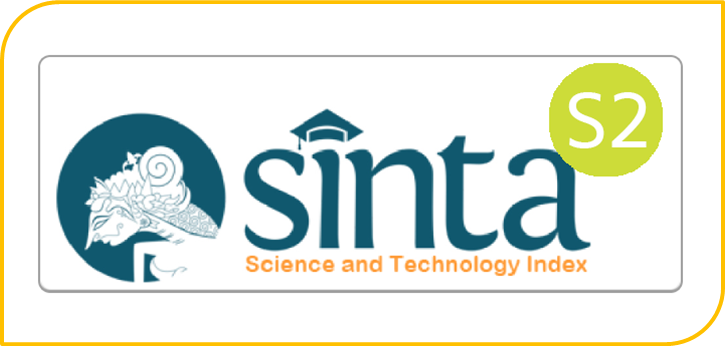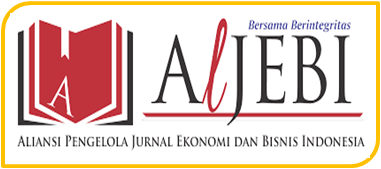ARE ISLAMIC BANKS STILL SOUND AMIDST PANDEMIC?
Abstract
The paper aims to check whether Islamic banks in Indonesia remain sound amid the Covid-19 Pandemic by comparing the soundness levels of Islamic commercial banks before and during the Covid-19 Pandemic. This research used a quantitative approach with the non-parametric Wilcoxon Signed-Rank Test to compare bank soundness before and during the Covid-19 Pandemic. The bank's resilience was measured using the Risk-Based Bank Rating (RBBR), e.g., Non-Performing Finance (NPF), Finance to Deposit Ratio (FDR), Capital Adequacy Ratio (CAR), and Net Operating Margin (NOM). The study exempted aspects of Good Corporate Governance since it is qualitative. The study used quarterly data in 2018-2019 (before the pandemic) and 2020-2021 (during the pandemic). The results showed a significant difference between CAR before and during the Covid-19 Pandemic. Meanwhile, NPF, FDR, ROA, and NOM showed no significant differences before and during the Covid-19 Pandemic. Based on the results, it can be concluded that the Covid-19 Pandemic generally does not affect the Islamic banks' soundness level, except for capital. It showed that the Islamic Bank proved to be resilient against crises. The study adds literature on the resilience of Islamic banks, particularly during the Covid-19 Pandemic, and validates the RBBR measurement to analyze the bank's soundness. In addition, the results of this study are also expected to be a consideration for policymakers to design the right policies for optimizing Islamic banks to thrive and support post-pandemic recovery.
Keywords
Full Text:
PDFReferences
Arafat, Q. Y., Abdul Rashid, & Qazi Waseem Jan. (2021). Impact of COVID-19 on the Performance and Stability of Conventional and Islamic Banks in the GCC Region, Malaysia, and Pakistan. Islamic Banking and Finance Review, 8(1), 25–37. https://doi.org/10.32350/ibfr/2021/08/1076
Aydemir, R., Atan, H. Z., & Guloglu, B. (2022). How do the global equity and bond markets affect Islamic and conventional banks? A comparative cross-country analysis using multivariate regression quantiles. Eurasian Economic Review, 12(1), 95–114. https://doi.org/10.1007/s40822-022-00198-5
Azmi, F., Pramono, N. H., & Wahyuni, M. (2021). Analisis Tingkat Kesehatan Bank Syariah Menghadapi Pandemi Covid-19. Jurnal Ilmiah Ekonomi Islam, 7(03), 1880–1888.
Bank Indonesia. (2020). Laporan Ekonomi & Keuangan Syariah 2020.
Bayu Indrawan, I. B. M., & Wirasedana, I. W. P. (2021). Indikator Risk Based Bank Rating, Kinerja Keuangan dan Perusahaan Perbankan. E-Jurnal Akuntansi, 31(3), 782. https://doi.org/10.24843/eja.2021.v31.i03.p20
Candera, M., & Indah, K. D. (2021). Financial Performance Islamic Banking: a Comparative Analysis Before and During the Covid-19 Pandemic in Indonesia. International Journal of Business, Management and Economics, 1(2), 44–52. https://doi.org/10.47747/ijbmer.v1i2.201
Djalante, R., Lassa, J., Setiamarga, D., Sudjatma, A., Indrawan, M., Haryanto, B., Mahfud, C., Sinapoy, M. S., Djalante, S., Rafliana, I., Gunawan, L. A., Surtiari, G. A. K., & Warsilah, H. (2020). Review and analysis of current responses to COVID-19 in Indonesia: Period of January to March 2020. Progress in Disaster Science, 6, 100091.
https://doi.org/10.1016/j.pdisas.2020.100091
El-Chaarani, H., Ismail, T. H., El-Abiad, Z., & El-Deeb, M. S. (2022). The impact of COVID-19 on financial structure and performance of Islamic banks: a comparative study with conventional banks in the GCC countries. Journal of Economic and Administrative Sciences.
https://doi.org/10.1108/jeas-07-2021-0138
Fakhri, U. N., & Darmawan, A. (2021). Comparison of Islamic and Conventional Banking Financial Performance during the Covid-19 Period. International Journal of Islamic Economics and Finance (IJIEF), 4(SI), 19–40. https://doi.org/10.18196/ijief.v4i0.10080
Farooq, M., & Zaheer, S. (2015). Are Islamic Banks More Resilient During Financial Panics? Pacific Economic Review, 20(1), 101–124.
https://doi.org/10.1111/1468-0106.12096
Frida Utami, R., & Makhrus. (2022). The Comparison of the Performance of Islamic Commercial Banks Before and During the Covid-19 Pandemic. Jurnal Bisnis : Teori Dan Implementasi, 13(1), 1–13.
https://doi.org/10.18196/jbti.v13i1.14257
Hasan, H. A., Mansyur, S., & Mustamin, S. W. (2021). Dampak Pandemi Covid-19 Terhadap Pertumbuhan Dana Pihak Ketiga Pada Bank Syariah. El Dinar, 9(1), 44–61. https://doi.org/10.18860/ed.v9i1.11431
Khoirunnisa, S., & Aliludin, A. (2021). Comparative Analysis of the Efficiency of Islamic Banking in Indonesia Before and During Covid-19 Pandemic. Advanced International Journal of Business, Entrepreneurship and SMEs, 3(9), 277–287. https://doi.org/10.35631/aijbes.39019
Le, T. D. Q., Ho, T. H., Nguyen, D. T., & Ngo, T. (2022). A cross-country analysis on diversification, Sukuk investment, and the performance of Islamic banking systems under the COVID-19 pandemic. Heliyon, 8(3), e09106. https://doi.org/https://doi.org/10.1016/j.heliyon.2022.e09106
Miranti, T., Aulia, N. A., & Pimada, L. M. (2022). How the Covid-19 Outbreak Affect the Efficiency of Islamic Rural Banks? El Dinar, 10(1), 56–68. https://doi.org/10.18860/ed.v10i1.15577
Mirzaei, A., Saad, M., & Emrouznejad, A. (2022). Bank stock performance during the COVID-19 crisis: does efficiency explain why Islamic banks fared relatively better? Annals of Operations Research. https://doi.org/10.1007/s10479-022-04600-y
Muhammad, R., & Triharyono, C. (2019). Analysis of islamic banking financial performance before, during and after global financial crisis. Jurnal Ekonomi & Keuangan Islam, 5(2), 80–86.
https://doi.org/10.20885/jeki.vol5.iss2.art5
Munandar, A. (2020). Performing Financing ( Npf ) Terhadap Net Operating. Ekomonica Sharia : Jurnal Pemikiran Dan Pengembangan Ekonomi Syariah, 6(1), 1–12.
Nabi, M. G., Ullah, M., Shaeba, M. K., & Alamin, M. (2022). Monetary Policy in the Dual Banking System: Bangladesh Perspective. Thoughts on Economics, 32(01), 7–24.
Nofinawati, Hasibuan, A. N., Sildiya, D., & Kurniawan, F. (2021). Comparative Analysis of Islamic Banking Financial Performance Before and During the Covid 19 Period in Indonesia. At-Tijaroh: Jurnal Ilmu Manajemen Dan Bisnis Islam, 7(2), 196–212. https://doi.org/10.24952/tijaroh.v7i2.4366
Nosheen, & Rashid, A. (2021). Financial soundness of single versus dual banking system: explaining the role of Islamic banks. Portuguese Economic Journal, 20(1), 99–127. https://doi.org/10.1007/s10258-019-00171-2
Prasidha, D. K., & Wahyudi, S. T. (2020). Dampak Nilai Tukar Dan Risk-Based Bank Rating Terhadap Prediksi Kondisi Perbankan Indonesia. Quantitative Economics Journal, 4(3), 122–142.
https://doi.org/10.24114/qej.v4i3.17467
Santoso, A., & Samboro, J. (2022). Islamic Commercial Banks: an Analysis the Determinants of Profit Distribution Management. El Dinar, 10(1), 45–55. https://doi.org/10.18860/ed.v10i1.13495
Siswantoro. (2022). The Effect Of Covid-19 Pandemic On The Soundness Of Islamic Banks In Indonesia. Kunuz: Journal of Islamic Banking and Finance, 2(1), 1–16. http://ejournal.iain-manado.ac.id/index.php/kunuz
Sugiharto, T., Azimkulovich, E. S., & Misdiyono, &. (2021). Impact Of The Covid-19 Pandemic On The Financial Performance Of Sharia Commercial Banks: An Empirical Evidence From Indonesia. IKONOMIKA: Jurnal Ekonomi Dan Bisnis Islam, 6(1).
https://ejournal.radenintan.ac.id/index.php/ikonomika
Sunardi, N. (2019). Analisis Risk Based Bank Rating (RBBR) Untuk Mengukur Tingkat Kesehatan Bank Syariah Di Indonesia. JIMF (Jurnal Ilmiah Manajemen Forkamma), 1(2), 50–66.
https://doi.org/10.32493/frkm.v1i2.2540
Sutrisno, S., Panuntun, B., & Adristi, F. I. (2020). The Effect of Covid-19 Pandemic on the Performance of Islamic Bank in Indonesia. Equity, 23(2), 125. https://doi.org/10.34209/equ.v23i2.2245
Syarief Iskandar, A., Ikram, M. S., & Musalamah, H. (2021). The Comparative Analysis of Financial Performance of Sharia Banking in Indonesia. In Pinisi Discretion Review (Vol. 4, Issue 2).
Trisnowati, Y., Hadiwidjaja, R. D., & Nurvita, T. (2021). The Consistency Of Islamic Corporate Financial Sustainability In Covid-19 Pandemic: An Empirical Analysis. AKRUAL: Jurnal Akuntansi, 12(2), 179.
https://doi.org/10.26740/jaj.v12n2.p179-192
Ulina, S., & Majid, M. S. A. (2020). A Comparative Analysis of Resilience of Islamic and Conventional Banks in Indonesia. Muqtasid: Jurnal Ekonomi Dan Perbankan Syariah, 11(2), 88–103.
http://dx.doi.org/10.18326/muqtasid.v11i2.88-103
Wahyudi, R., Mutmainah, L., Nahar, F. H., Adha, M. A., & Rifan, A. A. (2021). Determinants of profitability in Indonesian Islamic banking: Case study in the COVID-19 period. Integrated Journal of Business and Economics, 5(1), 37–46.
http://ojs.ijbe-research.com/index.php/IJBE/article/view/333
Wijana, I. M. D., & Widnyana, I. W. (2022). Is Islamic banking stronger than conventional banking during the Covid-19 pandemic? Evidence from Indonesia. Jurnal Ekonomi & Keuangan Islam, 8(1), 125–136. https://doi.org/10.20885/jeki.vol8.iss1.art9
DOI: https://doi.org/10.18860/ed.v10i2.17256
Refbacks
- There are currently no refbacks.
Editorial Office:
Megawati Soekarnoputri Building
Faculty of Economics
E-mail: eldinar@uin-malang.ac.id
Universitas Islam Negeri Maulana Malik Ibrahim Malang
E-ISSN 2622-0083

El Dinar under a CC BY SA 4.0 International License.
Member of:
Indexed By:

















